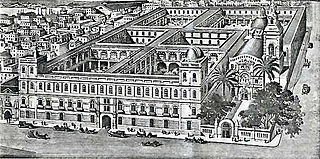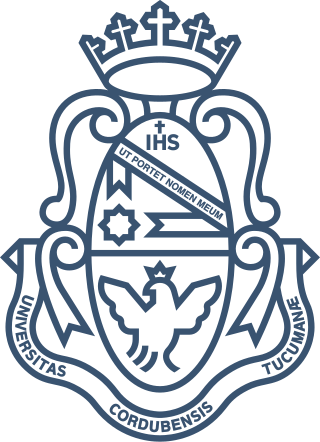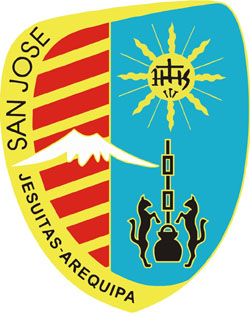
The National Autonomous University of Mexico, is a public research university in Mexico. It has several campuses in Mexico City, and many others in various locations across Mexico, as well as a presence in nine countries. It also has 34 research institutes, 26 museums, and 18 historic sites.

The Colegio de San Juan de Letran, also referred to by its acronym CSJL, is a private Catholic coeducational basic and higher education institution owned and run by the friars of the Order of Preachers in Intramuros, Manila, Philippines. It was founded in 1620. Colegio de San Juan de Letran has the distinction of being the oldest college in the Philippines and the oldest secondary institution in Asia. The school has produced Philippine presidents, revolutionary heroes, poets, legislators, members of the clergy, jurists, and it is also one of the only Philippine schools that has produced several Catholic saints who lived and studied on its campus. The school's patron saint is St. John the Baptist. The campus contains two statues, representing the two foremost alumni in the fields of secular and religious service: former Philippine President Manuel L. Quezon and Vietnamese Saint Vicente Liem de la Paz.

Colegio Nacional de Buenos Aires is a public high school in Buenos Aires, Argentina, affiliated to the University of Buenos Aires. In the tradition of the European gymnasium it provides a free education that includes classical languages such as Latin and Greek. The school is one of the most prestigious in Latin America. Its alumni include many personalities, including two Nobel laureates and four Presidents of Argentina.

Externado San Jose is a private Catholic primary and secondary school located in San Salvador, El Salvador. The institution began in 1921 as San Jose Seminary to which "outsiders" were later admitted. When the seminarians moved to a new facility the remaining school became an "externado". The school was founded and is run by the Society of Jesus.

Belen Jesuit Preparatory School is a private, Catholic, all-male, preparatory school run by the Antilles Province of the Society of Jesus in Tamiami, unincorporated Miami-Dade County, Florida, operated by the Society of Jesus. It was established in Havana, Cuba by the Jesuits in 1854 but moved to the United States after the communist government of Fidel Castro, himself an alumnus, took power and expelled the Jesuits. It has since made the Cardinal Newman Society's honor roll. The name Belen is Spanish for "Bethlehem."

Lasallian educational institutions are educational institutions affiliated with the De La Salle Brothers, a Catholic religious teaching order founded by French priest Saint Jean-Baptiste de La Salle, who was canonized in 1900 and proclaimed by Pope Pius XII as patron saint of all teachers of youth on May 15, 1950. In regard to their educational activities, the Brothers have since 1680 also called themselves "Brothers of the Christian Schools", associated with the Institute of the Brothers of the Christian Schools; they are often referred to by themselves and others by the shorter term "Christian Brothers", a name also applied to the unrelated Congregation of Christian Brothers or Irish Christian Brothers, also providers of education, which commonly causes confusion.
José María Vélaz was a Chilean-born Jesuit priest and educator. He is known for founding Fe y Alegría, a partnership between Jesuit priests, university students and families that began in 1955 in Caracas, Venezuela, and sought community mobilization and the provision of high-quality education for children from impoverished and marginalized communities. Vélaz's work is regarded as a social movement that was pivotal in Jesuit education's shift from the development of middle- and upper-class youth to the popularization of education for the underprivileged in Latin America.

Colegio San Pedro Claver is a private Catholic primary and secondary school, located in Bucaramanga, in the Santander Department of Colombia. The school was founded by the Society of Jesus in 1897 and is named in honour of St Peter Claver, the patron saint of Colombia. Students and graduates of the school are known as Claverians.

St Augustine College is a private Catholic secondary school, located in Cochabamba, Bolivia.

The National University of Córdoba, is a public university located in the city of Córdoba, Argentina. Founded in 1613, the university is the oldest in Argentina, the third oldest university of the Americas, with the first university being the National University of San Marcos and the second one, Saint Thomas Aquinas University.
Bolivian Americans or Bolivia-Americans are Americans of at least partial Bolivian descent.
The Colegio Cristo Rey is a Jesuit elementary and secondary school located in the city of Asunción, Paraguay. It was founded in 1938.

Colegio de la Inmaculada is a private Catholic primary and secondary school, located in Lima, Peru. Established by the Society of Jesus in 1878, the school finds its roots in Royal College of San Martin, founded by the Jesuits in 1582.

Colegio de San Ildefonso, currently is a museum and cultural center in Mexico City, considered to be the birthplace of the Mexican muralism movement. San Ildefonso began as a prestigious Jesuit boarding school, and after the Reform War it gained educational prestige again as National Preparatory School. This school and the building closed completely in 1978, then reopened as a museum and cultural center in 1992. The museum has permanent and temporary art and archeological exhibitions in addition to the many murals painted on its walls by José Clemente Orozco, Fernando Leal, Diego Rivera, and others. The complex is located between San Ildefonso Street and Justo Sierra Street in the historic center of Mexico City.

Colegio San José is a private Catholic pre-school, primary and secondary school, located in Arequipa, Perú. The selective school was founded in 1898 by the Society of Jesus and excels in academics and athletics. As of 2013, Colegio San José was one of 22, that received an "excellent" rating.

St Ignatius College, is a private Catholic primary and secondary school, located in La Paz, seat of government of Bolivia. The co-educational school was founded by the Society of Jesus in 1963.

St Callixtus College, is a private Catholic primary and secondary school, located in La Paz, Bolivia. The school was founded by the Society of Jesus in 1882, at the instigation of Monsignor Calixto Clavijo, and in his honour named for the third century martyr Pope Callixtus I.

St. Ignatius College, Santiago is a private Catholic primary and secondary school, located in Santiago, Chile. The school was founded by the Society of Jesus in 1856 and is run by the Jesuit St. Ignatius Foundation as a part of the Ignatian Educational Network of Chile, the Latin American Federation of Jesuit Colleges, and the Latin American Federation of the Society of Jesus (FLACSI).

Colegio Mayor de San Bartolomé is a private Catholic pre-school, primary and secondary school, colonial of Plateresque style building, located in the Santa Fe district of Bogotá, Cundinamarca, Colombia. The co-educational school was founded on 27 September 1604 by the Archbishop of Bogota Bartolomé Lobo Guerrero and the Jesuits José Dadey, Martín de Funes, Juan Bautista Coluccini, Martín de Torres, Bernabé de Rojas, and Diego Sánchez. The school is managed by the Society of Jesus.

















